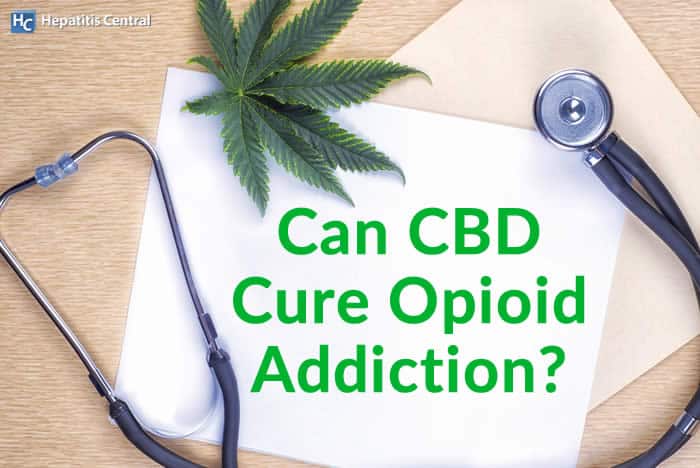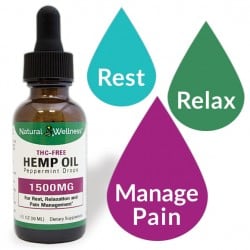Can CBD Cure Opioid Addiction?


What Is CBD?
Cannabidiol – commonly known as CBD – is a byproduct of cannabis that has shown potential to help a variety of health conditions.
Some popular uses include: (2)
- Treating liver issues
- Treating insomnia to get a better night’s rest
- Using its anti-inflammatory properties to deal with aches and pains
- Dealing with mental and mood disorders like stress, depression, anxiety, and PTSD
- Clearing up unwanted acne
People enjoy using CBD for the above reasons along with many others because, despite coming from cannabis plants, it is not psychoactive the way that THC is and won’t give them the unwanted high commonly associated with smoking weed – all while still providing great benefits.
It’s starting to become increasingly popular and, after the passing of the 2018 Farm Bill legalizing all hemp products, it is no longer classified as a drug. This has lead to an explosion in popularity for CBD!
To help clarify things, below are the 2 types of CBD:
- CBD Isolate – It is pure CBD extracted from hemp. It is made when manufacturers take an extra step in the extraction process to make sure no THC or terpenes are in the product.
- Full Spectrum CBD – This form of CBD has a minimal amount of THC in it (less than .3%). It will provide a slight high to you known as “the entourage effect.”
How Can CBD Fight Opioid Addiction?
Those living with hepatitis have found that CBD helps relieve some of their symptoms, including liver inflammation, exhaustion and mood changes.
But one area that hasn’t been covered as in depth is how CBD can help those living with hepatitis also treat their possible drug addictions. (1)
There is a major connection between those who abuse drugs and alcohol and those who are diagnosed with hepatitis. Those who perhaps share needles or engage in unprotected sexual intercourse while under the influence of addictive drugs stand a strong chance of contracting hepatitis B or hepatitis C.
If you contracted the virus or fear potentially getting it if you don’t turn your life around, you may want to consider using CBD to help kick the habit and free yourself of addictive substances. Or, if you’re simply hooked on a prescription drug that you feel you no longer need, CBD could also be good for you. (4)
There are new studies coming out showing that CBD can help those stop crippling addictions.
One reason it is believed to help is due to CBD’s anti-inflammatory properties which help ease the pain people usually feel when withdrawing from substances. Some doctors believe that CBD helps brain cells that were previously damaged by opioids communicate better, leading to less anxiety and cravings for drugs. Studies are still in preliminary stages, but researchers are very optimistic on the matter. (1)
In states where medical marijuana has been legalized, there are starting to be experimental studies where those addicted to opioids are weaning themselves off with the use of CBD and THC. Some believe it’s the combination of using both of them together, while others are finding results from patients who are just using CBD.
It’s also worth noting that states that have legalized marijuana for either medicinal or recreational use have found a decrease in both filled opioid prescriptions and opioid-related overdoses and deaths compared to states that have not legalized marijuana. That’s not to say you should go out there and start smoking marijuana, but you may want to consider trying CBD, especially if you aren’t looking to get high. (1)
How to Take CBD
CBD comes in many forms. Some people inhale it from vaporizer pens, while some people get it in edible forms.
But one of the most effective methods is getting it as a tincture which can easily be applied under the tongue or mixed into a beverage. Many people prefer tinctures due to how fast it can be absorbed into your bloodstream. Plus, a lot of manufacturers add natural flavors like peppermint to it so it tastes nice.
There are many other ways to take CBD as well; you just have to find what works best for you. (3)
Safety and Side Effects
CBD has considerably minor side effects. Most notably, there have been cases of tiredness, nausea, or changes in appetite. Although it can make you tired at times, it’s also intended to work as a sleep aid, so if it’s making you tired, it’s working properly. Moreover, after you take it and have a good night’s sleep, you should feel well rested and energized the next day.
If you are concerned though about taking CBD, you should consult with your physician to make sure you won’t have any adverse effects, especially if you are currently on any medications. (2)
When choosing what CBD brand to purchase, you should also be cognizant of a couple of things.
- First, you want to make sure that the bottle is properly labeled with supplemental facts. The label should tell you everything that’s in the product that you are buying so you know how pure it is and that there aren’t any unwanted chemicals in there.
- Secondly, you should see if the company you are purchasing from can provide a COA – Certificate of Analysis – to prove it was tested by a third party and validate its purity. Being that CBD isn’t FDA regulated, testing isn’t mandatory, so you want to make sure you purchase from a company that takes the extra time to properly test their products. (1)
If you do decide to try using CBD in order to get off opioids – it’s best to have a plan in place. Talk to your doctor about this and work together.
You shouldn’t just go cold turkey. Progressively take less and less of your prescribed medication while slowly increasing the amount of CBD you take every day. This way you can see what kind of withdrawal symptoms you have to deal with and you can see how CBD is affecting you.
If it doesn’t help at first, don’t be discouraged; it may take some time. But you should discuss your progress with your doctor as you go along.
Hopefully, over time, you will be able to be off opioids and start living a healthier, happier life. (1)
1. /@cbdorigin. (2019, March 19). The Top 3 Ways to Use CBD - CBD Origin. Retrieved July 03, 2019, from https://medium.com/cbd-origin/the-top-3-ways-to-use-cbd-9ebff8c305f0
2. Wong, C. (2019, June 26). Is CBD Oil Healthy and Safe to Use to Treat Illnesses? Retrieved July 03, 2019, from https://www.verywellhealth.com/cbd-oil-benefits-uses-side-effects-4174562
3. National Institute on Drug Abuse. (2013, May 16). Viral Hepatitis-A Very Real Consequence of Substance Use. Retrieved July 03, 2019, from https://www.drugabuse.gov/related-topics/viral-hepatitis-very-real-consequence-substance-use
4. Peachman, R. (n.d.). Can CBD Treat Opioid Addiction? Retrieved July 03, 2019, from https://www.consumerreports.org/cannabis/can-cbd-treat-opioid-addiction/








